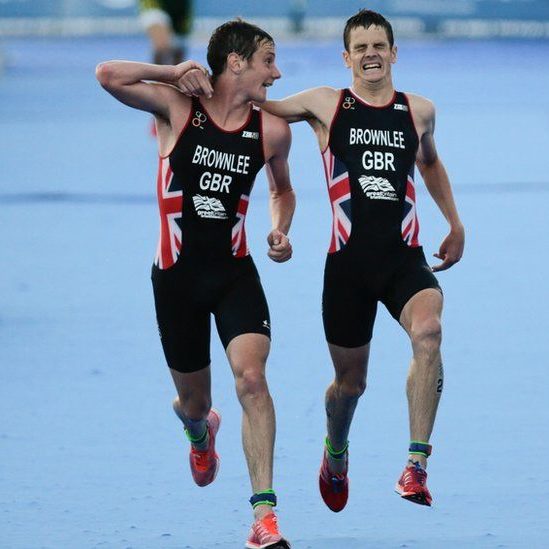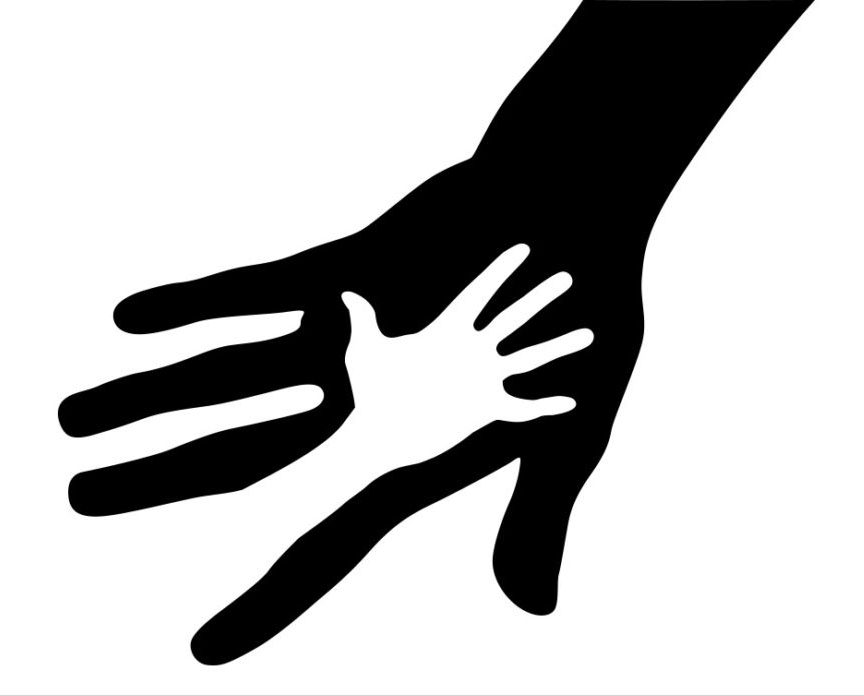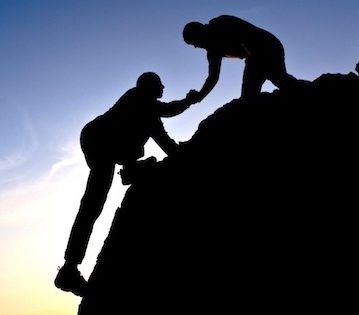
Can I help you?
What does it mean to help another human being, or an entire community? It’s a question we ask a lot at Nurture Development. There is something in the (above) image of the Brownlee brothers that captivated the world; the moment when Alistair Brownlee, stopped short of finishing in 2nd place to push (help) his brother Jonathan over the line (video here). For some it was the act of sportsmanship, for others perhaps an expression of brotherly love, and yet for others it’s best understood as one person offering another help in their time of need. Given that we all want to help and be helpful to one degree or another, what can we learn from this act of kindness about helping?
If your reading this blog, there is a good chance that you’re in the business of being helpful to others. So let me frame the rest of this post in the context of what we as practitioners working in the helping professions can draw from this poignant event. Take a moment to watch Alistair’s interview post race: https://www.youtube.com/watch?v=p3I_t62VsDM
There are some expressions of humility that really stand out, and this is definitely one; in my view the power of this expression of helping is three-fold:.
1. Brownlee’s first lesson in helping starts with a story, where he recounts an experience of carelessness from his fellow athletes. Having been in the exact position as his brother in 2010, no one was there to offer him support over the line.
Alistair notes: ‘it’s dangerous to fall before the finishing line -it’s as close to death as an athlete gets.’
It strikes me as I reflect on this lesson that Alistair is embodying, that we are all surrounded by people and systems trying to help us every single day, but we are also surrounded by carelessness. Too often in the moments of greatest need the help we receive just doesn’t hit the mark, and sometimes the help does not arrive at all. Here the care he gives is a freely given gift of the heart, it is not a transaction, it is not managed, curricularised or controlled. And that’s the difference that made the difference.
2. The second lesson relates to a particular context of the race, namely the finish line. Brownlee’s decision is as a fellow racer; he knows the importance of crossing that line but also understands the risks. A triathlon is a community of racers, as we are a society of citizens. To stretch the analogy further, as helping professionals we must take time to understand context; not only through the eyes of our organisations as spectators from the sidelines, but as citizens and stewards invested in the race.
3.Lastly, his values trumped the rulebook. The interviewer brings up the issue of this being “legal or not legal”. Rules and procedures cannot account for every eventuality; they will err on the side of caution and could if we allow them, paralyse kindness.
I remember in the days that immediately followed the moment in question, wondering, ‘what other options did Alistair Brownlee have?’
Was he supposed to:
- Run right past his brother in pursuit of victory, in obedience of the modern rule: for him to win someone has to lose? (Compete for victory)
- Throw his brother right over his shoulder and carry them home for tea and medals? (Rescue as would any red-blooded hero)
- Stand-fast, call a medic and start first aid? (Pathologise his condition)
The intervention was one that felt timely, proportionate and sensitive to the context.
If we transpose this into nurturing citizen-led action, what does it mean to helpful to people, associations, businesses or communities, and what can we learn from the Bromlee’s experience? In search of evidence to what “helping” might look like for the general public, I hit the Internet. My first search, “helping” brought up 1000’s of pictures. They had variety but a common theme shone through, patriarchy:
- One hand higher than the other
- Pulling the other onto higher ground
- One hand larger and more superior than the other
There appears to be a significant bias among the general population towards one-way ameliorative relationships where the helper dominates over the helped; one doing to or for another, but where the helper behaves as if the helped has nothing to offer the helped. And this is Alistair’s bonus lesson on helping, he says humourously: “I wish he’d paced himself”, but acknowledged that was exactly what he failed to do himself in 2010. So even in the moment of his brother fallibility he could see his strength and what he needed to work on to be more productive, safe and competitive for the next race.
As valid as helping done to or for someone can be, it is nevertheless important to consider what its limitations are. Don’t get me wrong, if I fell down in street I’d quite like someone to provide first aid to me – it is a timely invention that is within context. Yet without moderation of this form of helping there is a strong likelihood that it reinforces privilege and oppression.
As the brothers crossed the line the Commentator exclaimed “I’ve never seen this anywhere in the history of sport.” And is this not the key point? Here we have a rare glimpse at what a person / helper can do when they are in right relationship with another. The good news is that though it is an unusual occurrence, it’s not the only example. At a time when our world desperately needs such examples, we need to be tenacious enough to actively rummage around to discover them because they are there in each of our lives but they are invisible against the backdrop of classic forms of Helping. We miss them in the randomness of their expression, but if you have a mind to search them out, they actually are quite abundant, and if we’re a little more careful and carefilled we can cultivate a lot more.
The good life is filled with opportunities to exchange our gifts, but as Dan Duncan notes, community is about running the marathon of life to the rules of a relay race.
So let’s keep on, keeping on, together!
Shaun Burnett




Shirley Berry
Re defining what it means to finish well.
Society often tells us that to finish well means being first over the line. However what we see with the Brownlee Brothers challenges this notion and presents a re difinition.
It had been a while since I watched this and watching it again stirred a strong emotion of euphoric celebration about what it can mean to interact as human beings for a collective good.
6 Years ago I climbed Kilimanjaro with my husband, son of 15yrs and 4 friends. We all wanted to finish well, we all wanted to make it to the summit and experience the great sense of joy and achievement that this climb could bring. However more than that we wanted to experience that moment with one another. So we organised ourselves in such a way as to give a collective victory the best chance. So the story was important, whilst we got to know our guide and porters through the easier parts of the trek we took the opportunity to help them understand what we needed them to help us do so that a collective victory was possible. They began to understand our “brand” or what we stood for. The guide became part of the team and he then brought his expertise into the solution and plan. He brought his helpfulness to us and we matched that with our knowledge of personal limitations, team goals and values. However even with intent and planning we all in different ways began to struggle on the final summit. However we all took responsibility of reminding the team that we could do this and that we weren’t going to leave anyone behind. As cliche as it sounds when you are at the end of your own capacity and another commits to journeying with you towards the goal that does bring a profound human connection that has the ability to evoke unknown strength and motivation. The result was we all finished and finished well. Would it have meant that we wouldn’t have finished well if one hadn’t made it? I don’t believe that it would. I believe our same intention would have shaped whatever hard decision we would have had to make and we would have still finished well. When winning involves a desire for collective achievement then there has to be a desire to see others grow, bloom and succeed past our own abilities.
This reminds us that when splendid talented citizens commit to finishing well together the result often is a triumphant collective ascendency that evokes a collective “all is well in my soul” moment.